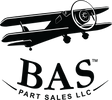This Cessna Citation 500 Aircraft is located in the airfield at BAS Kansas City




List of available parts from this Cessna Citation 500:
- Nose Cone
- Baggage Door LH
- Baggage Door RH
- NLG Strut Assy
- NLG Doors
- Windshields
- Pilot DV Window
- Pitot Tubes
- Main Landing Gear Strut Assy LH
- Main Landing Gear Strut Assy RH
- Main Landing Gear Door LH
- Main Landing Gear Door RH
- Main Landing Gear Actuators
- Aileron RH
- Flap LH
- Flap RH
- Leading Edge Inbd LH
- Leading Edge Inbd RH
- Wing Tip RH
- Wing Assy LH
- Wing Assy RH
- Fuel Pumps
- Inlet Assy LH
- Inlet Assy RH
- Cowling LH
- Cowling RH
- Horizontal Stabilizer
- Elevator LH
- Elevator RH
- Elevator Trim RH
- Vertical Stabilizer
- Rudder
- Rudder Trim
- Tail Cone
- Emergency Exit Door
- Pilot Seat
- Co-Pilot Seat
- Co-Pilot Control Yoke
- Throttle Quadrant
- Landing Gear Selector
- Glareshield
- Cockpit Switches & Breakers
- Refreshement Center Forward LH
- Cabin Chairs (5)
- Fold Out Executive Table
- Aft Potty Seat Assy
- Cabin Overhead Panel
- Cabin Side Panels
- Cabin Pressure Outflow Valves
Cessna Citation 500: History, Impact, and Legacy
Developmental Challenges and Strategic Decisions:
The 1960s presented a unique challenge to the "Big Three" American general aviation manufacturers—Beechcraft, Cessna, and Piper. The emergence of light business jets like the Learjet 23 and Aero Commander 1121 Jet Commander disrupted the market. These new jets offered significantly lower operating costs compared to established models such as the North American Sabreliner and Hawker Siddeley HS.125. Previous attempts by Beechcraft and Cessna to enter the light jet market had been unsuccessful. Cessna's T-37 Tweet jet trainer adaptation failed due to a lack of interest, while Beechcraft's marketing of the Morane-Saulnier MS.760 Paris in North America yielded minimal sales.
The success of the Learjet, however, forced a reevaluation. Cessna recognized the need for a light jet that would retain the ease of operation of its piston-engine aircraft but with significantly increased speed. This realization led to the development of the Citation 500, a machine specifically designed to appeal to traditional Cessna customers – amateur owner-pilots who desired a blend of performance and ease of use.
The Fanjet 500 and the Citation I:
Initially named the Fanjet 500, the prototype made its first flight in September 1969. Its development was not a short process. The initial design underwent several refinements, including a longer forward fuselage, repositioned engine nacelles, a larger tail, and increased dihedral in the horizontal stabilizer. Certification as the 500 Citation followed in September 1971. The design featured two Pratt & Whitney Canada JT15D-1 turbofan engines, which, combined with its straight-wing configuration, provided a relatively slow cruise speed compared to contemporary swept-wing jets. While this slower speed earned it the nickname "Slowtation" from some competitors, it also made the aircraft significantly easier and safer to handle, appealing to its target demographic.
The Citation I, an upgraded version introduced in 1976, increased gross weight, featured improved JT15D-1A engines, and a greater wingspan. This upgrade enhanced the aircraft’s range, speed, and service ceiling. In 1977, the Citation I/SP, the single-pilot variant further broadened the aircraft’s appeal by offering exceptional accessibility to a broader range of pilots.
Market Impact and Legacy:
The Citation 500 series' impact on the aviation industry was undeniable. It successfully carved a niche in the market for a light jet that was faster than turboprops but significantly easier to handle and less demanding on pilot skills and runway length than other business jets. This appeal to a broader spectrum of pilots and owners significantly expanded the light jet market. The Citation I/SP, in particular, lowered the barrier to entry for pilots, making private jet ownership a realistic proposition for more people.
The aircraft's relatively low operating costs contributed to its success. The blend of performance, ease of operation, and affordability made it a desirable option for a large segment of the business aviation community. The inherent ease of maintenance compared to more complex jets lowered the overall cost of operation and ownership.
Operational History and Notable Accidents:
The Citation 500 and its variants saw extensive use across various sectors, serving both private and government clients. However, its operational history is not without incidents. The tragic death of New York Yankees catcher Thurman Munson in 1979, caused by a landing accident, stands as a sobering reminder of the inherent risks of aviation. Other incidents highlighted the importance of proper pilot training and proficiency in managing emergencies.
Conclusion:
The Cessna Citation 500's lasting legacy is inextricably linked to its success in creating a viable and accessible market for light business jets. Its design and performance characteristics resonated strongly with a segment of the aviation community previously underserved by the available options. While newer generations of Citation jets have surpassed the original Citation 500, its pioneering role remains significant. Its impact on design philosophies, market expansion, and the future of light jet aircraft undeniably solidifies its place in aviation history. The Citation 500's success paved the way for subsequent models, establishing Cessna's Citation line as a dominant force in business aviation for decades to come.
From Fanjet to Hemisphere: A Cessna Citation Timeline
1960s
- 1969: Citation I (prototype first flight September 15th)
1970s
- 1971: Citation 500 certified
- 1976: Citation I (upgraded version), Model 550 (Citation II) announced
- 1977: Citation I/SP (single-pilot variant), Citation II first flight
- 1978: Citation II certified
- 1979: Model 650 (Citation III) maiden flight
- 1982: Citation III certified
1980s
- 1984: Citation S/II first flight
- 1985: Citation I production ends
- 1987: Citation V prototype first flight
- 1988: Citation V certified
- 1989: CitationJet launched
1990s
- 1991: CitationJet first flight
- 1992: CitationJet certified, Citation VI produced
- 1993: Citation Ultra announced, Citation 526 (CitationJet trainer) first flight
- 1994: Citation Excel announced
- 1995: Citation Bravo first flight
- 1996: Citation X first flight, Citation Excel certified
- 1998: Citation Encore announced
2000s
- 2000: Citation VII production ends
- 2002: Citation Sovereign announced
- 2004: Citation Sovereign certified, Citation CJ3 first flight
- 2005: Citation Mustang first flight
- 2006: Citation II/Bravo production ends, Citation Mustang certified
- 2008: Citation Columbus announced
- 2009: Citation Columbus cancelled
- 2011: Citation V production ends
2010s
- 2010: Citation CJ4 built
- 2012: Citation Sovereign+ announced
- 2014: Citation Latitude prototype first flight
- 2015: Citation Latitude certified
- 2016: Citation Longitude first flight
- 2017: Citation Mustang production ends, 2,000 CitationJets delivered
- 2018: Citation X production ends, Citation Hemisphere development suspended
- 2019: Citation Longitude certified
2020s
- 2022: Citation deliveries reached 8,000.
Cessna Citation 500 Parts Available from BAS Part Sales
Industry Leading 90-Day Money-Back Guarantee
You may return parts or request a replacement within 90 days of the purchase date with no penalty. We'll also pay the return shipping costs if the return is a result of our error (if you received an incorrect or defective item, etc).
We do not accept returns on anything marked CORE, Fuselages, or anything stating "No Returns Accepted".
If the return is past 90 days from the date the item was delivered, you may incur a restocking fee. Each return is handled on a case-to-case basis, and we do our best to be fair and reasonable.
Once we receive your returned parts, you should expect to receive your refund within a week or so. In most cases, you will receive a refund quickly.
If you need to return an item or want a replacement, fill out the form HERE with your order number, details about the product you would like to return, and the reason for the return. We will respond quickly with instructions for how to return items from your order.
Our 90-day guarantee is our commitment to treating our customers honestly and fairly. We put every part through a rigorous process before we make it available for sale. Despite our best efforts, sometimes we do not have the capability to test certain items, or we might miss something during the inspection process.
Condition Codes for BAS Part Sales Inventory
As-Removed:
Part removed from aircraft in its original, unaltered state. Most of the inventory available from BAS Part Sales is in As-Removed condition. We removed it from the aircraft in working condition and expect it to pass inspection. As-Removed items come with our 90-day Money-Back Guarantee. Read More
Core:
A non-functioning or damaged item that can be used for parts or possible repair. We DO NOT offer refunds on core items. These items are listed with "Core" in the title and typically have details in the product description related to what we found wrong with it.
Overhauled:
An as-removed item that has been sent to a shop for repair or rebuild. These items, of course, come with our 90-day money-back guarantee.
NOS - New Old Stock:
Item that is factory new but has been stored for a period of time that is usually past stock limit date. These items also come with our 90-day money-back guarantee.
Certifications & Documentation:
If an item is offered for sale with an 8130, STC, or other documentation, that detail is typically notated in the product title and the description. If it is not notated, then BAS cannot provide any certification for that item.
Meet YOUR Parts Team
The BAS Sales Team is stacked with knowledge and expertise from every aspect of the aircraft salvage business. Let our team of Experts help you find the right part the first time.
You can reach the sales department during business hours - 7:30 am to 4 pm Mountain Standard Time - by calling 970-313-4823 or via email at sales@baspartsales.com
We will promptly assist in any way possible, such as verifying the right part or part number, taking measurements or additional pictures, discussing or arranging shipping and transit prior to your purchase, or anything else you need to be confident that you are buying the right part from the right people.

Matt Rangel - Colorado Sales Lead
BAS Part Sales Colorado
970-414-7303 Direct

Mike Rangel
BAS Part Sales Colorado
970-414-7304 Direct

Geoff Watkins
BAS Part Sales Colorado
970-414-7154 Direct

Juan Castro - Missouri Sales Lead
BAS Part Sales Kansas City
816-690-8800

Matt Brewe
BAS Part Sales Kansas City
816-690-8800

Mike Hutfles
BAS Part Sales Kansas City
816-690-8800




















